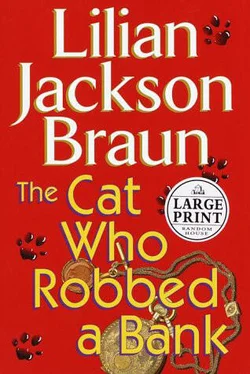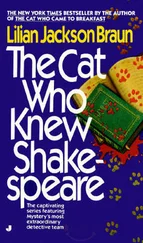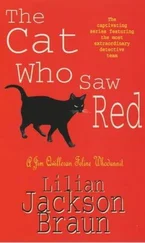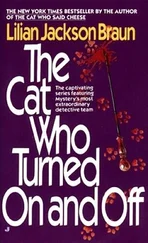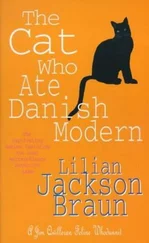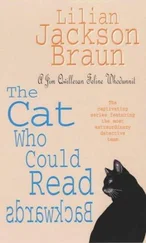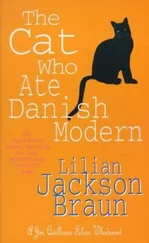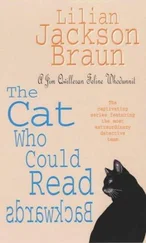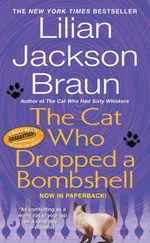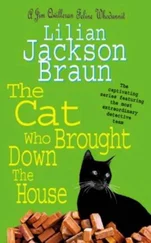Lilian Braun - The Cat Who Robbed a Bank
Здесь есть возможность читать онлайн «Lilian Braun - The Cat Who Robbed a Bank» весь текст электронной книги совершенно бесплатно (целиком полную версию без сокращений). В некоторых случаях можно слушать аудио, скачать через торрент в формате fb2 и присутствует краткое содержание. Год выпуска: 2000, ISBN: 2000, Издательство: Random House Large Print, Жанр: Старинная литература, на английском языке. Описание произведения, (предисловие) а так же отзывы посетителей доступны на портале библиотеки ЛибКат.
- Название:The Cat Who Robbed a Bank
- Автор:
- Издательство:Random House Large Print
- Жанр:
- Год:2000
- ISBN:9780375408786
- Рейтинг книги:3 / 5. Голосов: 1
-
Избранное:Добавить в избранное
- Отзывы:
-
Ваша оценка:
- 60
- 1
- 2
- 3
- 4
- 5
The Cat Who Robbed a Bank: краткое содержание, описание и аннотация
Предлагаем к чтению аннотацию, описание, краткое содержание или предисловие (зависит от того, что написал сам автор книги «The Cat Who Robbed a Bank»). Если вы не нашли необходимую информацию о книге — напишите в комментариях, мы постараемся отыскать её.
The Cat Who Robbed a Bank — читать онлайн бесплатно полную книгу (весь текст) целиком
Ниже представлен текст книги, разбитый по страницам. Система сохранения места последней прочитанной страницы, позволяет с удобством читать онлайн бесплатно книгу «The Cat Who Robbed a Bank», без необходимости каждый раз заново искать на чём Вы остановились. Поставьте закладку, и сможете в любой момент перейти на страницу, на которой закончили чтение.
Интервал:
Закладка:
The Cat Who Robbed a Bank
Lillan Jackson Braun
One
IT WAS A SEPTEMBER to remember! In Moose County 400 miles north of everywhere, plans were rife and hopes were high.
First, the historic hotel in Pickax City, the county seat, was finally restored after the bombing of the previous year, and it would reopen with a new name, a new chef, and a gala reception.
Then, a famous American (who may or may not have slept there in 1895) was about to be honored with the city’s first annual Mark Twain Festival.
Next, a distinguished personage from Chicago had reserved the presidential suite and would arrive on Labor Day, setting female hearts aflutter.
To top it off, the tri-county Scottish Gathering and Highland Games would be held at the fairgrounds: bagpipes skirling, strong men in kilts tossing the caber, and pretty young women dancing the Highland Fling on the balls of their feet.
The one unexpected happening was the homicide on the Pickax police blotter, but that was a long story, starting twenty-odd years before.
As September approached, the good folk of Pickax (population 3,000) were quoting Mark Twain about the weather, suggesting ribald names for the hotel, and gossiping endlessly about a man named Delacamp; few would ever meet him, but all had something to say about him.
Jim Qwilleran, columnist for the Moose County something, felt an air of anticipation when he made his rounds of downtown Pickax. When he went to the bank to cash a check, the young woman who counted out his fifties said, ”Isn’t it exciting? Mr. Delacamp is coming again, and he always comes into the bank. I hope he comes to my window, but the manager usually handles his transactions. Anyway, it’s all so thrilling!”
“If you say so,” Qwilleran said. After a long career as a newspaperman he was seldom excited and certainly never thrilled.
At the florist shop where he went to order a flowering plant for a sick friend, the wide-eyed assistant said breathlessly, “Did you hear? Mr. Delacamp is coming! He always has to have fresh flowers in his hotel room, and he sends roses to his customers.”
“Good!” said Qwilleran. “Anything that helps the local economy has my approval.”
While picking up a New York Times at the drugstore he heard a woman customer saying she had received an engraved invitation to Mr. Delacamp’s afternoon tea, and she wondered what kind of perfume to wear. The pharmacist’s wife said, “They say he likes French perfumes. We don’t carry anything like that. Try the department store. They can special-order.”
Qwilleran crossed the street to the department store, his newshound instincts scenting a good story with human interest and a touch of humor. Lanspeak’s was a large fourth-generation store with new-fashioned merchandise but old-fashioned ideas about customer service. He found the two owners in their cramped office on the main floor.
“Hi, Qwill! Come on in!” said Larry Lanspeak.
“Have a cup of coffee,” said his wife, Carol.
Qwilleran took a chair. “No coffee, thanks, but please tell me something. Explain the Delacamp mystique.” He knew the couple were official hosts for the man’s visit. “Why all the excitement?”
Larry looked at his wife, and she made a helpless gesture. “What can I say? He’s an older man, but he’s handsome elegant gallant! He sends women roses!”
“And kisses their hands,” said Larry with raised eyebrows.
“He pays lavish compliments!”
“And kisses hands,” Larry repeated derisively.
“Everything is very formal. Women have to wear hats to his Tuesday afternoon tea, and we’ve sold out of millinery. We sell the basic felt that women wear to church, but our daughter said we should gassy them up with feathers and flowers and huge ribbon bows. So we did! Diane is a sober, dedicated M.D., but she has a mad streak.”
“Takes after her mother,” Larry said.
“The results are really wild! Sorry you can’t write it up, Qwill, but everything is private, invitational, and exclusive. No publicity!”
“Okay I’ll forget it. No story,” Qwilleran acquiesced. “But he sounds like an interesting character… You two go back to work.”
Larry accompanied him out of the office and toward the front door, down the main aisle between cases of men’s shirts and ties and women’s scarves and earrings. “Old Campo is harmless, although a trifle phony,” he said. “Still, his visits every four or five years are good for a certain element in our community and good public relations for the store. It’s Carol’s project, actually. I stay out of it.”
The facts were that Delacamp was a dealer who bought and sold estate jewelry, making periodic visits to remote areas with a history of affluence. In such communities the descendants of old moneyed families might be willing to part with an heirloom necklace of rubies and emeralds, or a diamond tiara, in order to finance a new car or a college education or an extravagant cruise. Artisans in Delacamp’s Chicago firm could break up such outdated items and remount them in rings, pendants, earrings, and so forth for sale to a new generation as an investment or status symbol.
Moose County fitted the picture, and Delacamp apparently had found his visits worthwhile. It had been the richest county in the state in the nineteenth century, when natural resources were being exploited and there was no income tax to pay. The old mining tycoons and lumber barons had built themselves mansions with large vaults in the basement. They had sent their offspring to eastern colleges and had taken their wives to Paris, where they bought them jewels that would appreciate in value. When the mines closed in the early twentieth century, the economy collapsed and most families fled to the big cities. Others elected to stay and live quietly on their private means, going into business or the professions even bootlegging during Prohibition.
All of this convinced Qwilleran that Old Campo had a good thing going, and he enjoyed listening to gossip in the coffee shops. Blue-collar and white-collar opinions were freely expressed:
“He’ll be puttin’ on the dog and gettin’ the old gals all het up.”
“They say he drinks nothin’ but tea, but ten to one he puts a little somethin’ in it.”
“Yeah, I was night porter at the hotel a few years ago, and he used to send out for rum. He was a big tipper, I’ll say that for him.”
“I know a guy his wife drew ten thousand from their joint account and bought a diamond pin.”
“I’m glad my wife’s not on his list. Women go to that tea party of his and they’re pushovers!”
“He always brings a female assistant, and she always happens to be young and sexy. She’s supposed to be his cousin or niece or something, but you never notice any family resemblance, if you know what I mean.”
Gossip was the mainstay of Moose County culture, although it was called “caring and sharing.” Men had their coffee shops; women had their afternoon circles.
Qwilleran listened to it and nodded and chuckled. He himself had been the subject of gossip. He was a bachelor who lived simply, and yet he was the richest man in the northeast central United States. Through a twist of fate he had fallen heir to the vast Klingenschoen fortune based in Moose County. Previously he had managed on a reporter’s salary without any particular interest in wealth; in financial matters, moreover, he felt like a simpleton. He handled the situation by establishing the Klingenschoen Foundation with a mandate to give the money away judiciously to benefit the community.
Needless to say, “Mr. Q” had become an icon in the north country, not only because of his generosity. He wrote a twice-weekly column, “Straight from the Qwill Pen,” that was the most popular feature in the newspaper. He had a genial disposition and a sense of humor, even though his brooding eyes gave him a look of meIancholy And he was his own man.
Читать дальшеИнтервал:
Закладка:
Похожие книги на «The Cat Who Robbed a Bank»
Представляем Вашему вниманию похожие книги на «The Cat Who Robbed a Bank» списком для выбора. Мы отобрали схожую по названию и смыслу литературу в надежде предоставить читателям больше вариантов отыскать новые, интересные, ещё непрочитанные произведения.
Обсуждение, отзывы о книге «The Cat Who Robbed a Bank» и просто собственные мнения читателей. Оставьте ваши комментарии, напишите, что Вы думаете о произведении, его смысле или главных героях. Укажите что конкретно понравилось, а что нет, и почему Вы так считаете.
